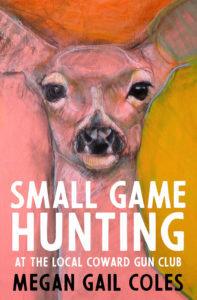February 5, 2019
Small Game Hunting at the Local Coward Gun Club, by Megan Gail Coles

If you hang a pistol in your novel’s title, law dictates that it’s going to go off before the book is over, even if your gun is a metaphoric one. And if the title of Small Game Hunting at the Local Coward Gun Club is not indication enough that this book is not going to be completely painless, its author, Megan Gail Coles even includes a warning: “This might hurt a little. Be brave.” But yes, be brave. Venture forth into this book, where the weather is extreme and feet are freezing, and nobody is holding your hand. Where the atoms fall like snowflakes in a blizzard, instead of orderly, in a straight line, one thing after another, as you’d expect from a more linear text. There are moments when you’ll find yourself lost in the storm, zero-visibility. But just keep going. Be brave.
There are sentences in Coles’ first book, Eating Habits of the Chronically Lonesome, that I have never forgotten, more than four years after I read them first. “The reason Garry did these things was ’cause he couldn’t afford any better. Half of what he earned over at Pretty Paws was carted off to Newfoundland. Child support for an autistic kid he had with Slutty Marie down Gilbert Street, this the result of a one night stand./ Have you ever heard a sadder story, Dame? I mean, really? I barely poked her.” Not a comfort read, you know what I am saying? Unforgettable, dark, slyly humorous, meticulously crafted sentences. I have been looking forward to Megan Gail Coles’ debut novel for a long time, and while it hurt a little, it also did not disappoint.
Ostensibly, Small Game Hunting... is the story of a trendy restaurant in St. John’s over the course of a single day in February while outside a snowstorm is raging. The chef has been sleeping with the hostess who is serving his wife’s father (whose money funds the establishment) as he has lunch with the city’s mayor. The bartender is in love with the hostess. The server is hungover. And the woman who’s been waiting in the doorway, without her boots on and cold and wet and aching feet, has ties to the hostess, as they grew up together in rural Newfoundland, and to one of the restaurant’s customers, who not long ago caused her irreparable harm in an act of violence. And all of these characters have parents and sisters and ex-best friends who now hate them for justifiable reasons. “Sometimes John looks around the restaurant and wonders who is in the most trouble.”
It’s not an easy book. There is violence and there is trauma and there is an attention to language that requires the reader’s full investment, and while that investment pays off big time, the demand might also try some readers’ patience. Because Megan Gail Coles is asking a lot of her readers here, but she more than pays it back—not least of all letting plot be a huge incentive to keep on turning the pages. The tension is enormous in this web of emotions, ties and betrayals, and that proverbial gun is due to go off at any moment. The chef is fucking the hostess in the kitchen as his wife is coming down the street—you get the idea. The novel moving between each character’s point of view to add layer upon layer of meaning, and each character’s section has also its own voice, specific diction, preoccupations. It is a dizzying experience indeed to reside in so many minds at once.
But it’s also so rich, and we gain sympathy for even the most hapless characters, because nearly everyone in this book has done despicable things. And we see too the way that certain characters are imminently more forgivable than others, how they get away with everything, and by “certain characters,” I mean white men. “The defences of their choices would be vicious.”
In a recent profile, Coles described her novel as “a declaration of war on misogyny,” which is such a perfect articulation. Small Game Hunting at the Local Coward Gun Club is about the nonchalance with which men do harm to women, which is also a microcosm for an economic and political system that renders certain kinds of people disposable. Characters in the novel are robbed of opportunity, are played by institutions they trusted, are wracked by debt and addiction and systemic oppression. There’s a Gatsbyesque arc to the inevitability of their fates. And the men who cheat? Those reckless, careless characters? The bullet was never going to hit them. One way or another, they’re always going to be fine.






Bought this today (when I was looking for Bowlaway) and looking forward to it even more after reading your take on it.
It’s so good. I think you will think so too.